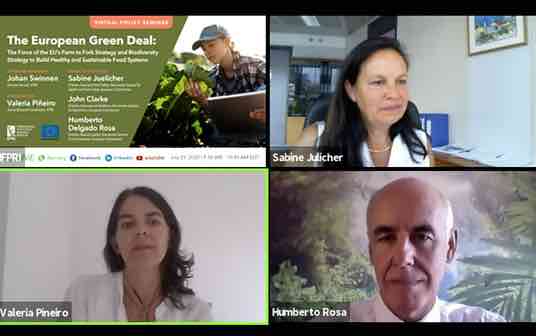The COVID-19 pandemic and its economic fallout have underlined the importance of building a robust and resilient food system that ensures access to healthy, affordable, and environmentally sustainable diets for all. The European Commission’s (EC) Farm to Fork Strategy and the Biodiversity Strategy, adopted in 2020, play an integral role in Europe’s ambitious response to climate change and environmental challenges along the food chain. A July 23 virtual event, co-organized by the EC and IFPRI, explored these strategies, their roles in the European Green Deal, and their international implications.
The European Union’s discussions on agricultural food policy have implications outside of Europe and North America. “It’s also the developing world, especially African countries, [which] will be heavily affected through what is being discussed today because they are connected to the EU through trade, global value chains, foreign investment, but also through regulatory spillovers,” said IFPRI Director General, Johan Swinnen. “Globally, the EU and its regulations have a major impact on agrifood trade, climate change, and sustainable development, which includes biodiversity.”
The European Green Deal, which sets out to make Europe climate-neutral by 2050, recognizes that food systems are integral to environmental and climate sustainability, as they both contribute to and face challenges from climate change. The Farm to Fork Strategy translates the Green Deal to the food sector by outlining challenges, opportunities, and a path to transition to more sustainable food systems. The strategy lays out 27 explicit actions with measurable targets, with impact assessments to monitor progress.
“What is very important is that we really include all policies that are relevant to food systems and that we include all actors,” said Sabine Juelicher, Director for Food and Feed Safety at the EC Directorate-General for Health and Food Safety. The Farm to Fork Strategy not only includes sectors along the chain of food production (agriculture) and food processing (retail, hospitality) but also consumers.
“Even though all participants in the food chain will be implicated in this strategy, it’s very evident that the farmers will have a very big role to play,” said John Clarke, Director for International Relations at the EC Directorate-General for Agriculture. The many Farm to Fork Strategy targets that require farmers’ actions include growing more organics crops, reducing pesticides and fertilizers, and increasing animal welfare and standards. Governments will also provide additional funding for the farming sector across Europe.
“Even though the Farm to Fork Strategy is primarily a European strategy, we want other regions and countries to follow our example or at least take comparable steps,” said Clarke. As Europe only represents 10% of global carbon emissions, he said, new trade agreements and action by United Nations will be necessary to boost sustainability worldwide. “We need to ensure that all our partners are taking similar steps because climate change, environment, biodiversity loss, and pollution do not respect national boundaries so our success is tied up with the success of others,” Clarke added.
“The EU Green Deal is a novelty of a novelty, as it does treat biodiversity on par with climate change in terms of importance for global sustainability,” said Humberto Delgado Rosa, Director for Natural Capital at the EC Directorate-General for Environment. Amid the COVID-19 crisis, the Biodiversity Strategy remains critical, he said, as not only is biodiversity loss a major threat to the environment and the global economy, the misuse and mismanagement of natural resources contribute to the faster spread of viral outbreaks.
As with the Farm to Fork Strategy, the Biodiversity Strategy outlines a number of actions with quantifiable targets for its goals. The strategy takes a comprehensive approach to biodiversity by considering diverse ecosystems including those in forests, in oceans, and in urban areas. In addition, the EU has set an ambitious global agenda to implement environmentally-friendly ocean, trade, and climate policies, and is promoting international cooperation in working towards a healthy and sustainable global food system.
With ample resources and ambitious goals to combat climate change, the Farm to Fork Strategy and the Biodiversity Strategy aim to make European food systems the gold standard for sustainability. “The Green Deal also said [the EU] should lead by example so this is pretty much what we aim with our strategies: Showing the ambition and commitments,” said Rosa.
Khiem Nguyen is an IFPRI Communications Intern.







